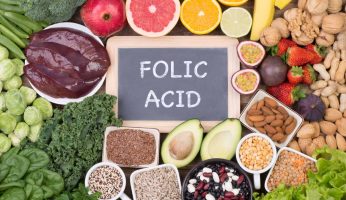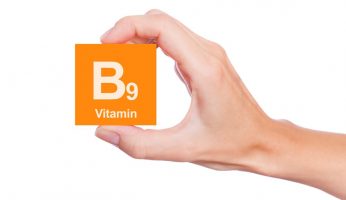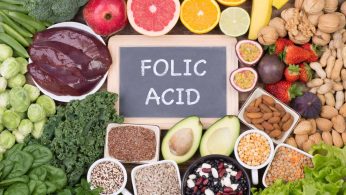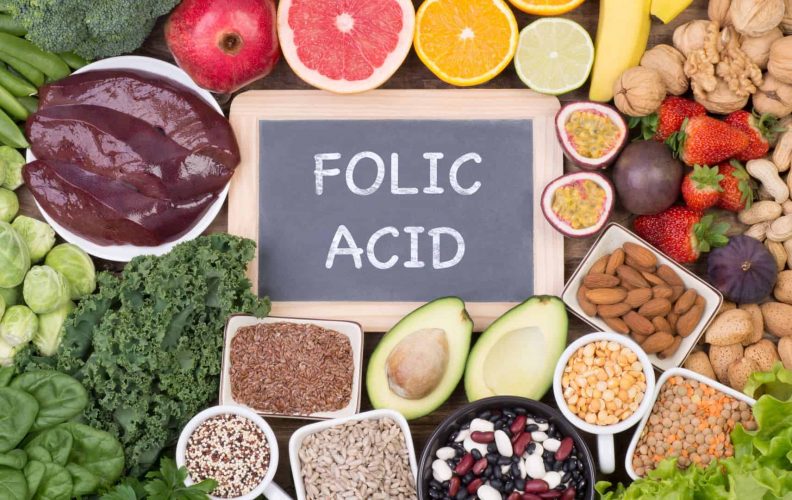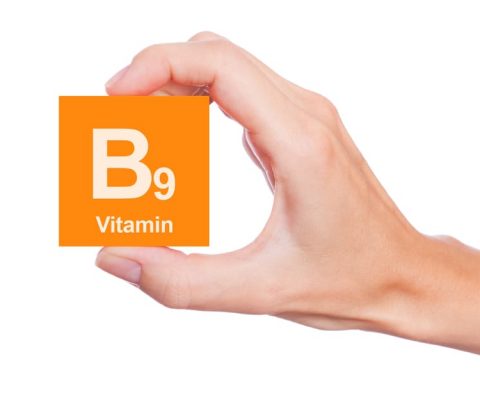Folate vs. Folic Acid: What’s the Difference and Which is Better?
Disclosure: We use affiliate links and may receive a small commission on purchases.
 Folate vs. Folic Acid: What’s the Difference and Which is Better?
thefitbay.com
Folate vs. Folic Acid: What’s the Difference and Which is Better?
thefitbay.com
Folate, folic acid, vitamin B9 – what’s the difference? It’s time to put an end to the confusion.
Folate and folic acid have many characteristics in common – the main one being that they both satisfy the body’s need for vitamin B9 – but they’re not exactly the same.
Both folate and folic acid supplements have their benefits, and depending on your unique needs, you may prefer one over the other. When comparing folate vs. folic acid, it’s important to remember that supplements are not one-size-fits-all. The best vitamin B9 supplement may differ from person to person.
Quick Answer
The main difference between folate and folic acid is that they come from different sources and the body metabolizes them differently.
You get folate from the fruits, vegetables, and other foods that you eat because folate is naturally found in foods. Folic acid is a man-made or synthetic source of vitamin B9 that is often added to enriched foods like pasta, cereal, and bread.
The National Institute of Health dictates that the word “folate” can be used to describe both naturally occurring food-derived folate and synthetic folic acid. (1) This can be confusing when you’re looking for the right vitamin B9 supplement for you. Although folate is used as an umbrella term for both folate and folic acid, it’s important to remember the difference between folate and folic acid (natural vs. synthetic, respectively).
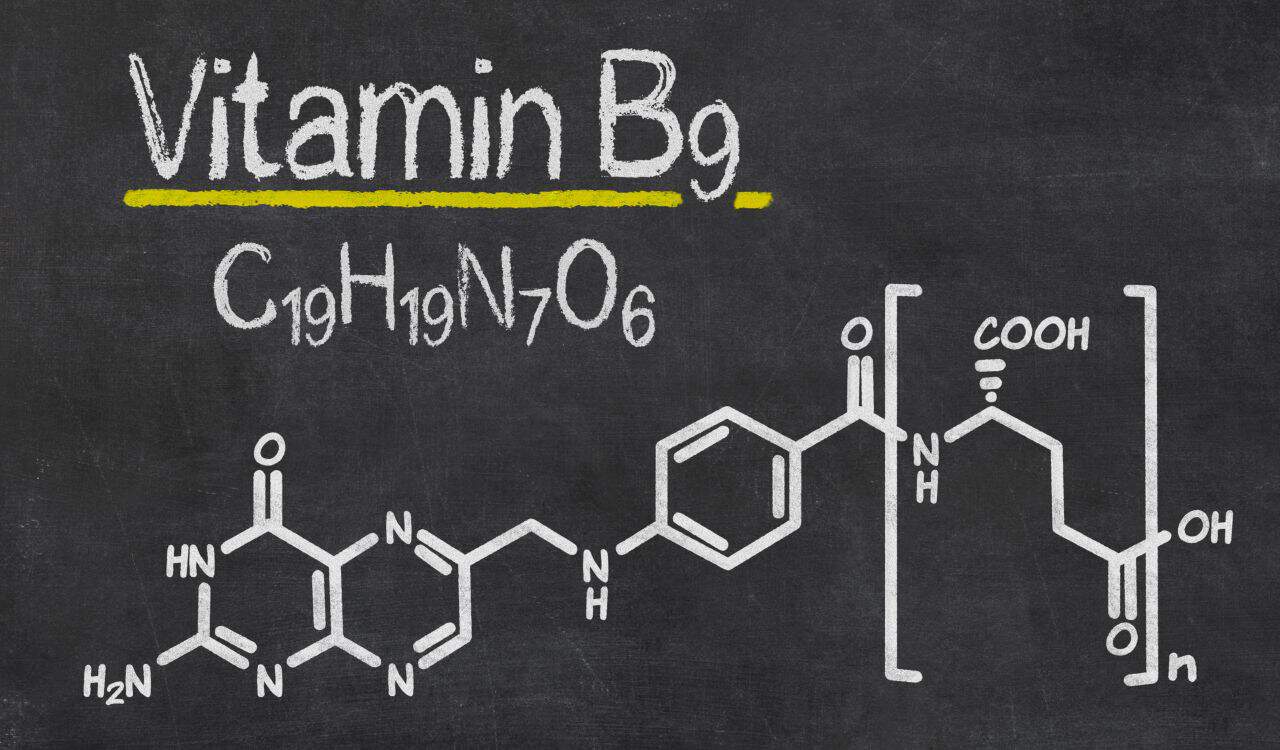
Researchers haven’t taken a stance on which is better – folate vs. folic acid – but they do agree that in addition to consuming supplements, you should continue to consume foods that are naturally rich in folate (i.e. leafy greens) and foods that are enriched with folic acid (i.e. grains) to satisfy your needs for vitamin B9.
Our research indicates that folate supplements more closely resemble the natural folate found in foods. This is better for people without the MTHFR gene mutation. However, folic acid – specifically 5-MTHF (a man-made source of folic that’s ready to be used by the body immediately upon ingestion) – may be a better choice for people with the MTHFR gene mutation since it’s biologically active.
If you have a well-rounded diet, you probably consume both folate and folic acid in your daily life. There’s folate in your salads, smoothies, steamed vegetables, and more natural and healthy food sources. Similarly, there’s likely folic acid in your toast, cereal, pasta, and other fortified foods. All these food sources contribute to your vitamin B9 needs. When you’re worried you may not meet those needs, that’s where folic acid and folate supplements come in handy.

- Best Folate
-
Our rating - Price: See Here


- Best Folic Acid
-
Our rating - Price: See Here

What Is Folate?
Folate is a natural source of vitamin B9. Many processes in the body are dependent on folate to function properly, which is why it’s vital to get adequate amounts of folate in your diet or through supplementation.
The synthesis of genetic material, DNA and RNA, and the metabolism of amino acids are both folate-dependent processes. Folate is also required for proper cell division, which is especially important in prevent birth defects and anemia. (2)
Foods that are rich in folate include: (3, 4)
- Vegetables: asparagus, avocado, brussel sprouts, broccoli
- Leafy greens: spinach, mustard greens, lettuce
- Fruits: orange, orange juice, banana, papaya
- Nuts: peanuts
- Legumes: kidney beans, black-eyed peas, green peas
All-natural folate supplements typically source folate from plant foods like lemon peel extract or from a blend of fruits and vegetables. Folate supplements may also use 5-MTHF as their main ingredient, which is the active form of folate.
How Much Folate Do I Need?
Depending on your age and whether you’re pregnant, your folate requirements may vary. Because folate and folic acid satisfy the same need for vitamin B9, the question is really “how much vitamin B9 do I need?” not “how much folate or folic acid do I need?”
On average, an adult needs at least 400 mcg of folate or folic acid per day (5, 6, 7, 8) from either food or supplements or a combination of both.
Pregnant women need more vitamin B9 in their lifestyles because developing babies need folate to grow and prevent birth defects. Because folate plays a crucial role in prenatal health and fetal development, pregnant women need at least 600 mcg of folate per day. (9, 10, 11, 12, 13) Some sources recommend that pregnant women aim for 800 mcg of folate per day. (14)

It’s important to not exceed your daily requirements for folate because it’s a water-soluble vitamin, which means the excess levels will leave the body through urine. High levels of folate have also been associated with masking signs of vitamin B12 deficiency.
You can adopt a folate-rich diet to meet your dietary needs, but folate supplements are an easy and sure way to prevent deficiency of vitamin B9.
6 Main Benefits of Supplementing with Folate
Folate plays a vital role in many bodily functions related to the brain, genetic material, and cellular activity. Supplementing with folate promotes these folate-dependent activities.
While you still get folate from the food you eat, supplementing with folate has its benefits:
-
Natural Source:
Supplementing with folate is still a natural source of vitamin B9. If all-natural ingredients are important to you, then folate supplements may be a good choice for you. Many folate supplements are derived from lemon peel extract or fruit and vegetable blends. When you supplement with folate, you’re still getting vitamin B9 from natural sources.
-
Synthesis of Genetic Material:
One of folate’s main roles in the body is to assist in the synthesis of genetic material (a.k.a. DNA and RNA). The human body is constantly creating new cells, which requires the transfer of genetic material. This is especially important during periods of growth – like during pregnancy, infancy, and adolescence – or during healing, such as post-injury.
-
Cellular Division:
When new cells are created, it is because one cell divided into two. Folate helps cells rapidly divide, develop, and grow. (15) During pregnancy, folate is crucial to promote proper cellular division for the developing fetus. (16) Otherwise, the baby could be born prematurely or with birth defects.
-
Works With Other Micronutrients:
Since folate is a B vitamin, it works closely with other B vitamins. This is why many folate supplements are sold as B complex vitamins. It’s especially important to take folate with vitamin B12 as folate has been known to mask symptoms of vitamin B12 deficiency. Folate and vitamin B12 work together to product healthy blood cells for adequate levels of iron, which prevents anemia. (17, 18, 19)
-
Red Blood Cell Production:
Red blood cells carry oxygen throughout the body in exchange for carbon dioxide. Because they only last for about 120 days, the body needs to produce more red blood cells. Folate works with other B vitamins to promote healthy red blood cell production, which ensures healthy iron levels, prevents anemia, and distributes oxygen throughout the body. (20)
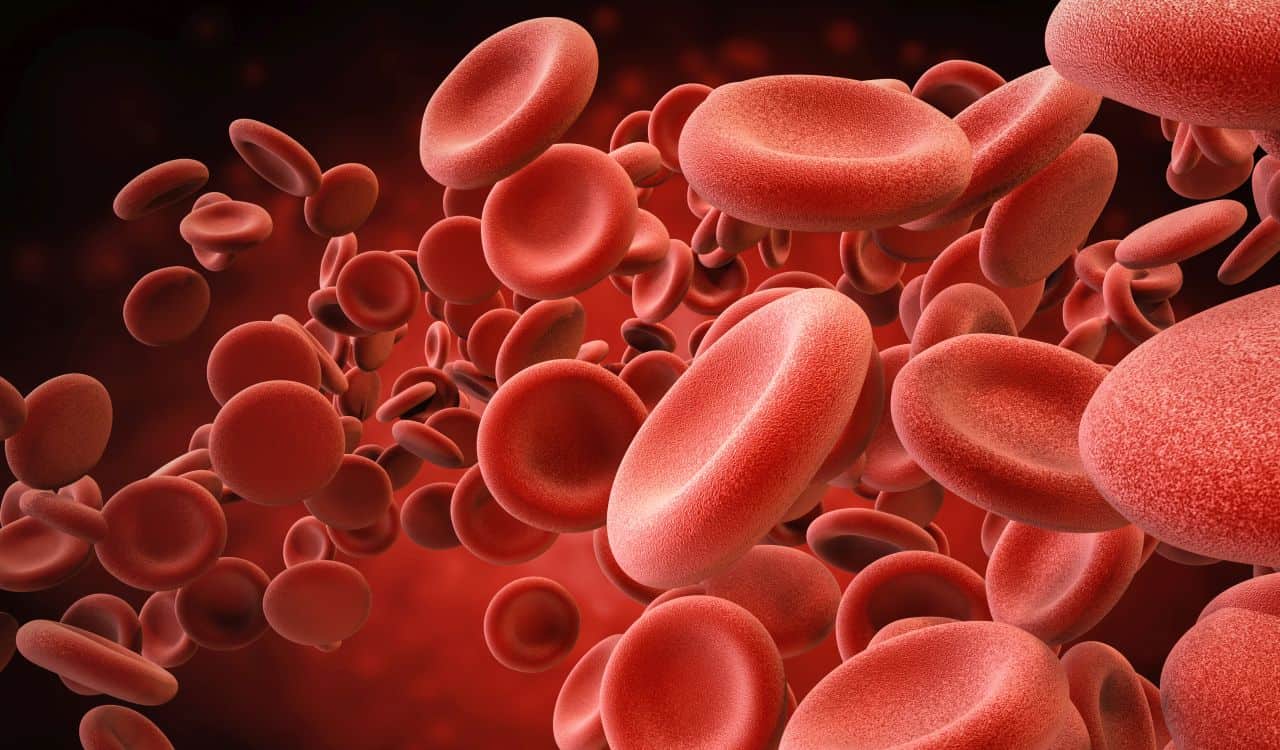
-
Supports the Nervous System:
Folate deficiency is associated with megaloblastic anemia, depression, and cognitive decline. (21) Adequate folate levels are especially important for the nervous system to function properly. Where cognitive function is concerned, folate is especially important in the elderly.
What Is Folic Acid?
Like folate, folic acid is a water-soluble compound that satisfies the body’s need for vitamin B9. However, folic acid comes from synthetic sources instead of natural ones, and the body reacts a little bit differently to folic acid.
Folic acid is commonly added to foods to prevent widespread deficiency of folic acid. Look for foods that say “fortified” or “enriched” and you might find that they have folic acid as an ingredient. This means you could be supplementing with folic acid without realizing it!
Foods that are often enriched with folic acid include:
- Cereals
- Grains
- Breads
- Flour
- Crackers
- Cornmeal
- Rice
Folic acid supplements are totally safe and recommended to people who may be at risk of folic acid deficiency. If you don’t get enough folic acid in your diet from breads, pastas, cereals, and grains, you may want to consider a folic acid supplement to prevent deficiency of vitamin B9.
Folic acid is usually listed as “folic acid” in supplements. There are different manufacturers of folic acid like Metafolin and Quatrefolic that have uniquely formulated folic acid to be more bioavailable in the body.
How Much Folic Acid Do I Need?
The dietary requirements for folic acid are the same for folate because they satisfy the same need for vitamin B9. However, if you’re getting a lot of folate in your diet, you may need a lower dose of folic acid.
Your needs for folic acid (a.k.a. vitamin B9) depend on your age. Children need up to 300 mcg of folic acid per day, whereas the average adult should get at least 400 mcg per day. (22, 23, 24, 25)
You can achieve this by consuming a diet high in folate-rich foods plus supplementing with a dose of folic acid to be confident that you’re meeting your needs.
In some cases, adults may need more folic acid. Pregnant women are a great example of this because a woman’s requirements for this vitamin increase during pregnancy. Pregnant women need extra folic acid to support their developing babies, which is why it’s recommended that pregnant women get at least 600 mcg of folic acid per day. (26, 27, 28, 29, 30)
A folic acid supplement gives you the reassurance that you’re not at risk of deficiency in vitamin B9.
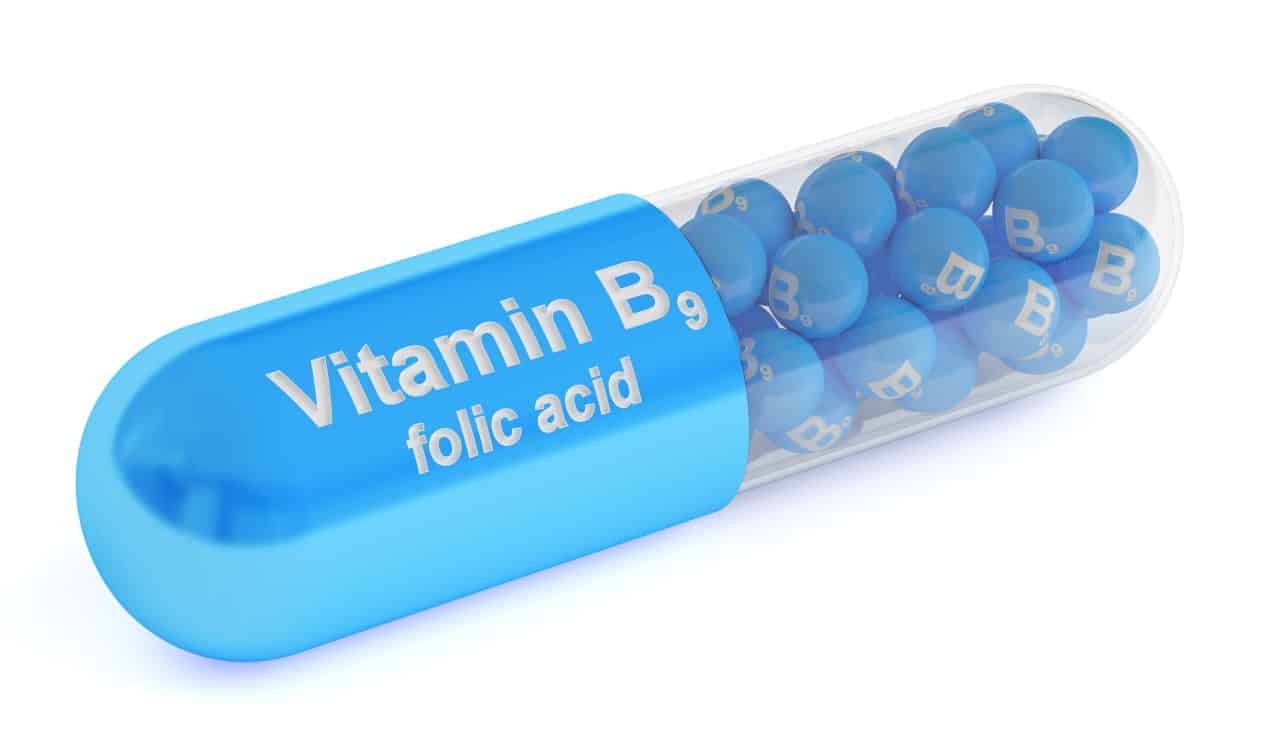
4 Main Benefits of Supplementing with Folic Acid
The main benefit of supplementing with folic acid is preventing vitamin B9 deficiency. Folic acid supplements make it easy to ensure that you’re getting your recommended daily intake of vitamin B9.
Folic acid supplements are also beneficial for the body, especially in prenatal and heart health:
-
Increased Bioavailability:
Folic acid is more stable and bioavailable than folate. However, approximately half of the population has a gene mutation that prevents folic acid from being converted to folate in the body. (31) In people without this mutation, folic acid is a more reliable source of vitamin B9.
-
Reliable Source of Vitamin B9:
Across the world, governments are requiring food to be fortified with folic acid because it’s a more reliable source of vitamin B9 than folate. (32) Since folate is mainly in leafy greens and animal liver, other foods must be enriched with folic acid to prevent widespread deficiency of folic acid. Supplementing with folic acid through food fortification decreases the risk of folic acid deficiency.
-
Prenatal Health:
Many prenatal vitamins contain folic acid for good reason – it plays a key role in the health of both the mother and the developing child. Pregnant women need higher levels of vitamin B9 to support the healthy development of the babies. This can prevent birth defects like neural tube defects and congenital heart defects. (33)
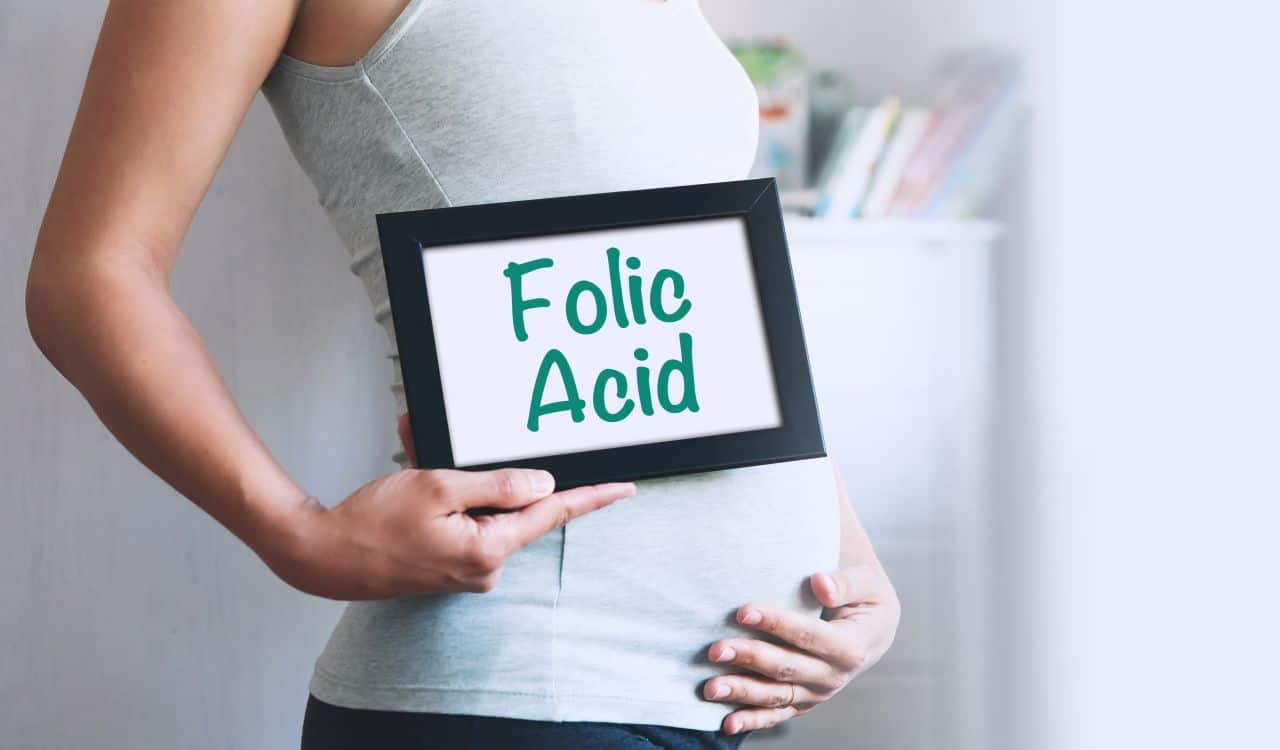
-
Reduced Risk of Stroke and Cardiovascular Disease:
B vitamins like folic acid naturally lower homocysteine levels, an amino acid that can harden and thicken arteries, and can reduce the thickness of arterial walls. (34) Studies also show that folic acid supplementation reduces stroke risk by 18% and cardiovascular disease risk by 4%. (35, 36) Folic acid plays a vital role in the healthy levels of homocysteine levels, and thereby reduces the risk for heart complications. (37)
So, What’s the Difference Between Folate and Folic Acid?
If you’re unsure about the differences between folate and folic acid, that may be because they both refer to compounds that satisfy the body’s need for vitamin B9. Despite satisfying the same needs, folate and folic acid aren’t the same.
Folate and folic acid have two main differences – where they come from and how they are metabolized by the body.
Difference #1: Folate and Folic Acid Come From Different Sources
Folate and folic acid are water-soluble compounds that satisfy the body’s need for vitamin B9. (38) However, they’re different sources for this key nutrient.
Folate comes from natural sources like food and edible plants – it’s especially abundant in dark, leafy greens like spinach and mustard greens. Since folate is naturally occurring, it can’t be created in a laboratory. Natural folate supplements typically contain powdered fruits and vegetables in a capsule or tablet.
Folic acid comes from man-made sources. Since it’s made in a lab, folic acid is highly researched and developed to resemble folate, and therefore vitamin B9. Folic acid supplements contain various forms of man-made compounds, all of which are synthetic materials designed to resemble folate.
Difference #2: Folate and Folic Acid Are Metabolized by the Body Differently
Where these compounds are sourced from isn’t the only thing that sets folate and folic acid apart. They’re also different in how they’re metabolized by the body.
Folic acid supplements are encouraged because they’re believed to be better absorbed by the body. (39) Folic acid supplements also believed to be more stable than naturally occurring folate.
However, folate from food sources and folic acid supplements requires extra steps to be converted into a usable form of folate. Some people have a mutation that inhibits this function, causing the folate and folic acid to be less effective. Depending on the severity of the gene, the folate and folic acid may be completely unusable and unmetabolized by the body.
There is a form of folate called 5-MTHF that’s just as effective as folic acid and doesn’t require extra steps to be converted because it’s already in its usable, active state. (40)
A diet high in folate-rich foods may be just as effective as folic acid supplements, and folate supplements – especially 5-MTHF – can be effective, too.
Of the key differences between folate and folic acid is in fact the way they’re metabolized or absorbed by the body, which is especially important for people with the MTHFR gene mutation to take into consideration. Let’s discuss this further.
Folate vs. Folic Acid Absorption
Both folate and folic acid are water-soluble, which means that they’re not stored in the body for very long. Folate is mainly stored in the liver but is also found in blood and body tissues. (41) Folate and folic acid are quickly excreted from the body through urine. (42) Since they don’t stay in the body long, it’s important to replenish levels through food sources or supplementation.
With food-derived folate and folic acid supplements, the body has extra steps to first convert it into active folate before the vitamins can be used. This is done through a series of enzymatic processes, including a final step called methylenetetrahydrofolate reductase (MTHFR).
A large portion of the population has inadequate MTHFR activity, so folic acid supplements may not be absorbed as effectively as folate in people with the MTHFR gene mutation.

In people without the MTHFR gene mutation, folic acid is believed to be 20% more bioavailable than folate (43) and may be preferred for the bioavailability and effectiveness.
In people with the MTHFR gene mutation, the biologically active form of folate, 5-MTHF, may be preferred because it’s equally as effective as folic acid without the risk of masking vitamin B12 deficiency or not being fully absorbed.
Folate vs. Folic Acid for the MTHFR Gene Mutation
Approximately 40% of the population is inflicted by the methylenetetrahydrofolate reductase (MTHFR) gene mutation, which means they can’t properly metabolize folate and folic acid. It’s not impossible, but the process is less effective.
MTHFR is an enzyme that the body uses in a metabolic process called methylation. This process is responsible for many gene and DNA-related functions in the body. It’s also responsible for converting both folate and folic acid into a usable, active compound called 5-MTHF.
People with the gene mutation may not experience any symptoms, but their enzyme efficiency could drop to 35-70%. (44)
This means that conventional folic acid supplements and foods that are fortified with folic acid aren’t as effective in people with this gene mutation. Fortunately, there’s an alternative, and it’s called 5-methyltetrahydrofolate (5-MTHF).
5-MTHF is the active form of folate and folic acid. By supplementing with 5-MTHF, the body doesn’t have to convert folate or folic acid into a usable form because 5-MTHF is active and ready for use.
Supplements containing 5-MTHF are shown to be more effective and less likely to mask symptoms of vitamin B12 deficiency. (45, 46, 47)
Because 5-MTHF is a form of folate, folate is superior to folic acid for the MTHFR gene mutation only when this form of folate is used.
Folate or Folic Acid During Pregnancy
Folate and folic acid requirements are different for women during pregnancy, so it’s important to take this into account.
During pregnancy, the mother and baby both have extra needs for vitamin B9. This is because cellular division and DNA synthesis are folate-dependent processes that occur during pregnancy while the baby is developing.
As an expecting mother, should you get your vitamin B9 from folate or folic acid?
Many clinical studies on the link between folate and pregnancy use folic acid during the trial. Folic acid supplements are more common and more reliable sources of vitamin B9. If bioavailability and reliability are important to you, you may prefer folic acid supplements during pregnancy.
However, folate is more natural, and appeals to people living an all-natural lifestyle. Some folate supplements are derived from powdered fruits and vegetables, which have added health benefits and satisfy other micronutrients. If natural ingredients are important to you, you may prefer folate supplements during pregnancy.
Consistently taking your folate or folic acid supplements during pregnancy is just as important as which one you choose. Pregnant women are advised to take at least 600 mcg of folate or folic acid per day to support healthy fetal development and prevent birth defects.
Both folate and folic share these common benefits during pregnancy:
-
Prevents birth defects:
Folate and folic acid supplements are one of the top supplements recommended for pregnant women because of the crucial role they play in preventing birth defects. Neural tube defects affect nearly 1 out of every 1,000 pregnancies, but folate and folic acid supplements can help prevent them. (48, 49, 50, 51, 52)
-
Reduce the risk of preterm birth:
Supplementing with folate or folic acid can prevent babies that are born too early or underweight. (53, 54, 55, 56) This prevents the babies from being born underdeveloped.
-
Promotes fetal development:
Pregnant women require extra folate or folic acid to help their babies develop properly. Pregnancy is a time when the fetus is synthesizing genetic material and undergoing rapid cellular division and replication. Folate and folic acid supplements can help with the synthesis of new cells and genetic material during fetal development. (57, 58, 59)
-
Promotes prenatal health:
Folate and folic acid are beneficial for the developing child as well as the mother. The body undergoes a lot of changes during pregnancy, and vitamin B9 is crucial in supporting the body during a time when cells are rapidly multiplying. It’s also important in preventing anemia, which is common among pregnant women. (60)
So, Which One Is Better…?
Clinical studies haven’t dictated that either folic acid or folate is better than the other. This is a matter of personal preference or conditional on the unique circumstances. Whether folate or folic acid is better for you depends on your situation.
The biologically active form of folate, 5-MTHF, is better if you have the MTHFR gene mutation or you’re concerned about safety.
However, folic acid is believed to be more reliable and more stable than folate, meaning you’re more likely to meet your vitamin B9 needs with folic acid.
When to Choose Folate?
People with the MTHFR gene mutation should always choose folate supplements that use 5-MTHF as the main ingredient. This mutation prevents folic acid supplements to be converted into folate, so the body can’t use it. 5-MTHF is the biologically active and usable form of folate, so the body doesn’t need to convert it. It’s ready for use, unlike folate from food sources and various forms of folic acid.
If you don’t have the MTHFR gene mutation, choosing between folate and folic acid comes down to personal preference. Folate supplements derived from fruits and vegetables may appeal more to people who follow an all-natural lifestyle.

- Solgar
-
Our rating - Biologically Active
- Price: See Here


- Designs for Health
-
Our rating - 660 Liquid Servings
- Price: See Here


- Doctor’s Best
-
Our rating - Physician Formulated
- Price: See Here

To learn more about folate and the top folate supplements, visit our in-depth guide to the best folate supplements.
When to Choose Folic Acid?
Folic acid supplements are preferable if you’re looking for a more effective, more bioavailable, and more stable compound to satisfy your vitamin B9 needs. If you don’t have the MTHFR gene and may be at risk of folate deficiency, you should choose folic acid to be sure that your body will absorb the vitamins.

- Bronson Vitamins
-
Our rating - Organic & High Potency
- Price: See Here


- Sundown Naturals
-
Our rating - Non-GMO
- Price: See Here


- NOW Foods
-
Our rating - Affordable
- Price: See Here

For more information on folic acid and supplement recommendations, visit our complete guide to the best folic acid supplements.
Conclusion
Many health institutions and clinical researchers use folate and folic acid interchangeably because they’re very similar. However, it’s important to note their differences when determining which supplement is right for you.
Since a large portion of the population have difficulty converting folate from food and synthetic folic acid sources to the usable, active form of folate, 5-MTHF is an option that works for everyone and still satisfies the body’s need for vitamin B9.
Both folate supplements and folic acid supplements have their places in your health routines, and we encourage you to keep in mind their differences, so you can choose the supplement that’s right for you.



